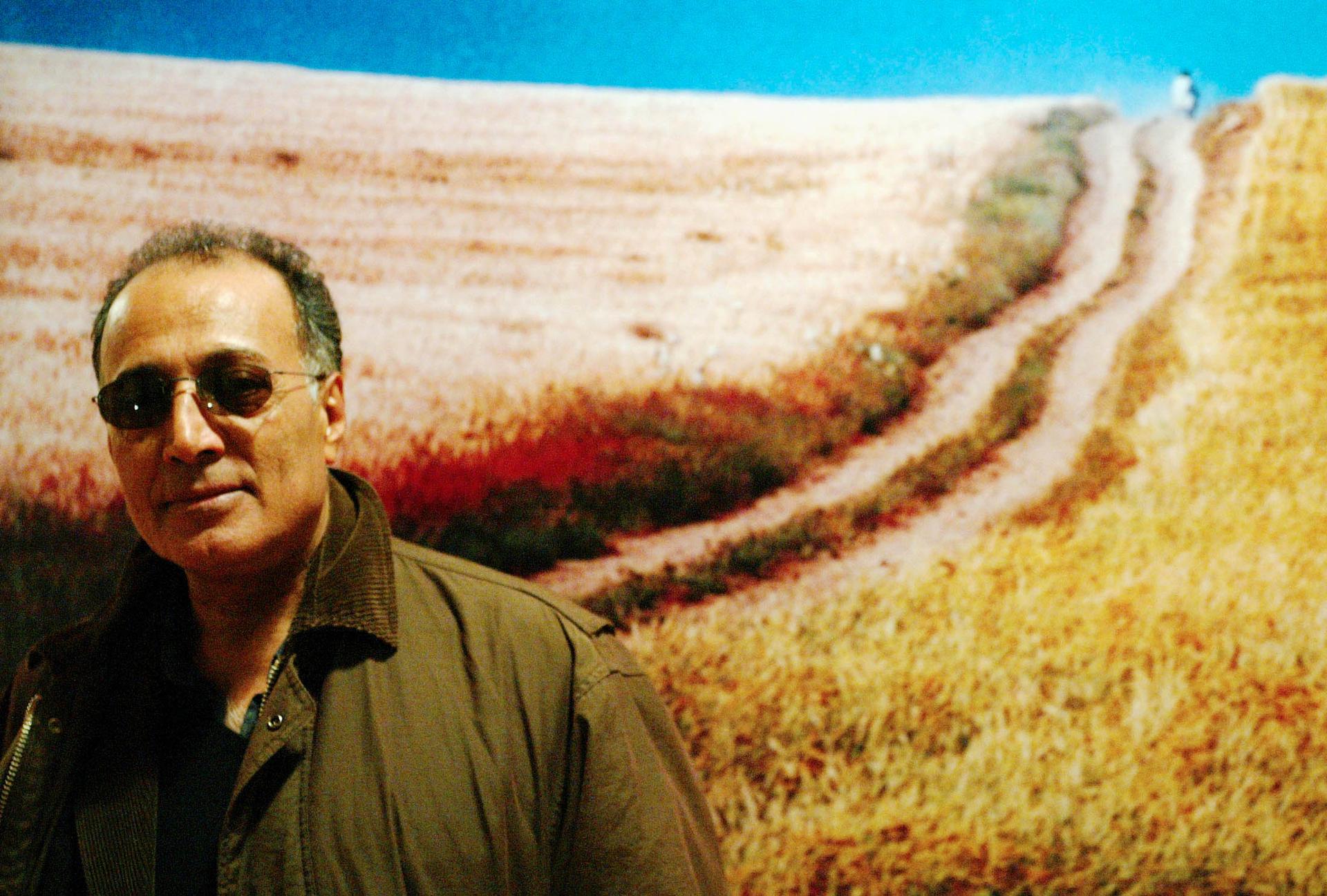Iranian film director Abbas Kiarostami poses in front of a poster for his film "The Wind Will Carry Us" at the Portuguese film museum in Lisbon February 27, 2004.
He won awards. The West adored his films. That did not win Abbas Kiarostami many friends in his native Iran.
Yet unlike many Iranian artists, the director kept living and working in Iran for decades after its 1979 Islamic Revolution, focusing on universal themes of compassion and "the human story on the ground," says writer Saeed Kamali Dehghan.
“Thanks to Kiarostami, we had a more realistic picture of Iran,” Dehghan says.
Kiarostami, who died on Monday in Paris at age 76, drew inspiration from realism and poetry. “He was one of those rare artists," Martin Scorsese said in a statement, "with a special knowledge of the world, put into words by the great Jean Renoir: ‘Reality is always magic.’"
“It’s a story of compassion. It’s a story about simple people caring about each other. That’s why I say that Kiarostami tries to show another picture of Iran. It might be a rural place, but compassion is stronger and people care about each other,” Dehghan says.
“Sometimes we in the West, and I am part of it now as well, forget to see the human story on the ground. Filmmakers, novelists, artists in general try to take a pause and tell us you have to look deeper. I think that’s what Kiarostami has achieved in telling many people in the world."
oembed://https%3A//www.youtube.com/watch%3Fv%3DebuVEeMPdyc
Kiarostami was born on June 22, 1940 in Tehran, where he studied painting. He started his career as a graphics designer making commercials for Iranian TV. In 1969, he joined Kanun (the Center for the Intellectual Development of Children and Young Adults) where he was assigned to make his own films that dealt with childhood problems.
“Everything in Iran, if you want to make a film, you have to submit everything about it to the Ministry of Culture and Islamic Guidance. Every single detail has to be approved. Kiarostami managed to stay in that society in the first place and then make films. Beautiful films,” Dehghan explains.
He's best known for his film "A Taste of Cherries," which won the Palme d'Or award during the Cannes Film Festival, making Kiarostami the first Iranian to ever win such a prize.
“When he won the Palme d’Or in 1997 and he returned to Iran, you would imagine this is the first Iranian filmmaker achieving this sort of recognition, he would receive a hero’s welcome. But he didn’t. The Iranians were quiet about it. They didn’t appreciate him as much,” Dehghan says. “They associated him with the West, so they didn’t appreciate it.”
Dehghan said few Iranians got the chance to see him in Iranian movie theaters. "I never watched any of his films on Iranian cinemas or Iranian national TV," Dehghan says. “"I got them from CDs and DVDs."
Kiarostami’s films were better received within Europe, especially in France. In his final years, he shot two movies in Europe.
oembed://https%3A//www.youtube.com/watch%3Fv%3D9JM7lMbf5e8
In his homeland, many took to social media to express their condolences.
"He wanted to make international movies and I think he succeeded. When you watch 'Where’s My Friend’s Home,' you’re not thinking I’m watching an Iranian film. I think you’re thinking that you’re watching a story that’s international that’s about compassion. I think that’s why it’s made him successful — he hasn’t limited himself. His main primary concern was not improving Iranian image, although he did it successfully. I think he wanted to make art and I think that’s why we remember him today."
Here's a classic scene from Kiarostami's 1990 masterpiece, "Close-Up." It's a tin can, rolling, but much more. Here's the final scene.
oembed://https%3A//www.youtube.com/watch%3Fv%3DZ_tGkf_jnCk
Every day, reporters and producers at The World are hard at work bringing you human-centered news from across the globe. But we can’t do it without you. We need your support to ensure we can continue this work for another year.
Make a gift today, and you’ll help us unlock a matching gift of $67,000!
